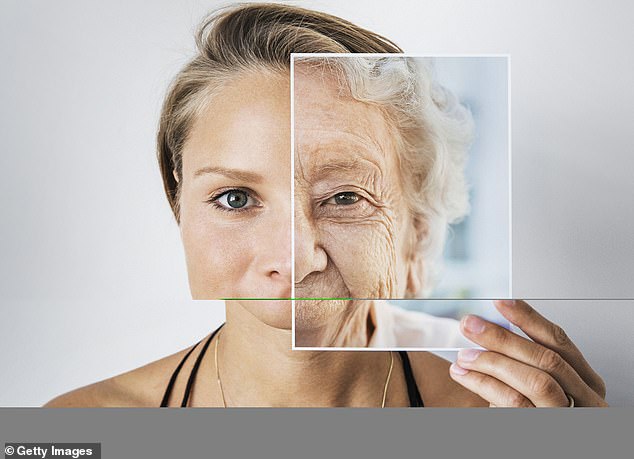Can you inherit the emotional scars caused by trauma and stress experienced by your parents, or even your grandparents?
Not only because of the psychological damage suffered by those who suffer from them, but also because of the changes in their genes that are then transmitted to their children?
A growing body of evidence suggests that may be the case.
“Intergenerational harm” is the term often used to describe harrowing psychological legacies, such as those of the Holocaust and apartheid in South Africa.
But now scientists are discovering a new possibility: that we can also physically transmit trauma through our altered genes (where certain genes are “on” or “off”).
A growing body of evidence suggests that you can inherit emotional scars caused by trauma and stress experienced by your parents, or even your grandparents.
One of the latest studies to suggest this was based on analysis of the genes of more than 900 British boys and girls whose mothers had been physically abused by their fathers when they were children.
The study, published in the journal Epigenetics, used data from the Avon Longitudinal Study of Parents and Children, an ongoing project that began in the 1990s. The new analysis, conducted by Syracuse University in New York, identified 903 mothers who said they had been physically abused by their parents.
Previous research has identified genetic changes in women who have been abused. When scientists examined DNA from the umbilical cord blood of children in the Avon study, they found changes similar to those seen in battered women, suggesting that altered genes had been passed on.
These gene alterations are known as epigenetic changes, caused as a result of our environment or lifestyle such as smoking. These changes can alter our physical health or our emotional behavior.
When researchers examined the children’s school psychiatric reports at age seven, their levels of anxiety, fear, and depression correlated closely with inherited genetic changes.
The idea that we could somehow inherit behaviors from previous generations was originally proposed more than 200 years ago by pioneering French biologist Jean-Baptiste Lamarck, but at the time his ideas were ridiculed.
However, in recent years, laboratory experiments have begun to demonstrate the value of this theory in terms of not only the environment in which children are raised, but also the actual changes in their DNA.
A groundbreaking 2010 study found that when mouse pups were suddenly separated from their mothers, they grew up displaying depressive-like behavior and being unusually fearful when placed in new environments.
DNA testing showed that the mice had epigenetic changes in genes associated with trauma and fear, according to lead researcher Isabelle Mansuy, a professor of neuroepigenetics at the University of Zurich, Switzerland, in an article in the journal Biological Psychiatry.
What’s more, when the male cubs themselves fathered offspring, they showed exaggerated fear and traumatic reactions, as well as genetic changes, despite having been raised in normal environments, Professor Mansuy reported.
More recently, Rachel Yehuda, a professor of psychiatry and trauma neuroscience at Mount Sinai School of Medicine in New York, found an epigenetic change in survivors of Nazi concentration camps and their descendants.
As their study noted, many Holocaust survivors suffer from post-traumatic stress disorder (PTSD) and other emotional conditions. But now it has been shown that it is not “just” the family environment that causes this, but rather inherited genes.
A 2016 study, published in the journal Psychological Trauma: Theory, Research, Practice, and Policy, found that one in five children of Holocaust survivors had generalized anxiety, marked by irrational and uncontrollable worry.
But in a recent study of 32 survivors and 22 of their adult children, Professor Yehuda found epigenetic changes in the same region of the FKBP5 gene (linked to anxiety and other mental health problems) in the survivors and their children. The alterations were not found in a comparison group of Jewish parents and their children who had lived outside Nazi-occupied Europe.

Scientists are discovering a new possibility: that we can also transmit trauma physically through our altered genes.
As an evolutionary adaptation, increased vigilance and fear can help offspring survive in threatening environments, says Professor Yehuda: “If you live in adversity, you may have a set of survival skills that have been honed from lessons of life from the past. But if you are not in adversity, you can become emotionally hypervigilant.
Fathers can pass on genetic alterations in their sperm caused by stress, suggests a 2019 study by the Queensland University of Technology in Australia.
When the researchers compared genes in the sperm of veterans with and without PTSD, they found epigenetic changes associated with stress and anxiety in the now-adult children of veterans if their parents had PTSD, but not in the others.
Professor Yehuda says this means a life-changing experience that “does not die with you.” It has a life of its own afterward in some way. The implications are that what happens to our parents, or perhaps even our grandparents, can help shape who we are at a fundamental molecular level that contributes to our behaviors, beliefs, strengths and vulnerabilities.’
There may even be measurable physical effects on the brains of children of traumatized people, according to 2022 research from Sakarya University in Türkiye.
They scanned the brains of 40 children whose mothers were exposed as teenagers to an earthquake that hit Türkiye in 1999.
Compared to scans of 27 children of mothers who had not experienced the earthquakes, the trauma group had a significantly smaller amygdala and hippocampus in their brain.
These areas “play important roles in relation to post-traumatic physiological responses,” reported the journal Psychiatry Research: Neuroimaging. “Our study shows that there may be a potential relationship between intergenerational trauma and various brain structures.”
Dr Chloe Wong, professor of epigenetics at King’s College London, believes inherited stress can have a big impact on our lives.
“Children of traumatized mothers inherit that stress in the womb,” she says. “Studies have even shown that the changes in their DNA are different depending on how old they were in the womb when the stress occurred.” He adds that research has also shown that “inherited stress” can even accelerate the rate at which the body and brain age.
However, not everyone is convinced of the strength of this relationship. London-based Dr Heather Sequeira, a consultant psychologist with a special interest in trauma, told Good Health that the behavior of traumatized parents can have a much stronger influence on their children’s mental health than any genetic inheritance.
“It is impossible to separate the emotional influence of parents from epigenetic transmission,” he says. ‘They are tangled. It is multifaceted and intertwined.”
The fact that traumatized mothers do not bond with their babies from an early age could have a particularly strong influence.
Dr Heather Sequeira says: ‘Being raised by someone who does not feel safe and relaxed can have a serious effect on the transmission of traumatic feelings. In the first three to five weeks of life, the baby’s nervous system is in its crucial stage. Failure to form strong parental bonds can affect later psychological development.’
But it’s not completely confirmed whether that stress can be passed on to grandchildren, adds Dr. Chloe Wong. “Research suggests that most of our epigenetic inheritance appears to disappear before the generation of grandchildren arrives.”
The good news, he says, is that studies show that “harmful epigenetic changes are reversible.”
Professor Mansuy’s research has found that when baby mice that had been traumatized early in life were placed in cages that had very favorable environments (with wheels to run on, toys, a maze and lots of other mice to socialize with). ), their genetic changes decreased and they showed no symptoms of trauma. Neither do his offspring.
Dr Chloe Wong explains: “We know that people who exercise, eat a healthy diet and get enough sleep have a younger epigenetic age. Everything you do could change your epigene for better or worse.
Dr. Heather Sequeira says the main threat is that epigenetic changes can lead to chronic inflammation, “one of the biggest dangers to the brain and body.”
‘Numerous studies show that this chronic inflammation can be calmed with healthy eating, such as a Mediterranean-style diet, regular exercise, meditation, mindfulness, and not eating ultra-processed foods (because they are inflammatory). That’s one more reason to take care of ourselves.
And who knows, maybe your grandchildren (and even their children) will ultimately thank you.


